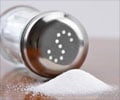Highlights
- The biological principle of salt excretion is actually water conservation and water production.
- To conserve water, the body must either take in more fuel or break down muscle mass.
- High salt induces a catabolic state driven by glucocorticoids that break down muscle protein.
- Increased levels of glucocorticoids are an independent risk factor for diabetes, obesity, heart disease.
According to the textbooks, the excretion of dietary salt will inevitably lead to water loss into the urine and thereby reduce body water content. On the contrary, research findings showed that the biological principle of salt excretion is actually water conservation and water production.
It takes a lot of energy to conserve water in the face of salt excretion. The body either must take in more fuel or break down muscle mass. "This predisposes to overeating," said the reports’ senior author, Jens Titze, M.D., associate professor of Medicine and of Molecular Physiology and Biophysics.
High Salt Diet Induces Hunger, Food Intake
Between 2009 and 2011, Titze and his colleagues conducted long-term sodium balance studies in Russian cosmonauts who were participating in a human space flight simulation program at a research facility in Moscow in preparation for a potential manned spaceflight to Moscow.
In a subsequent study in mice, the researchers showed that high salt induces a catabolic state driven by glucocorticoids that break down muscle protein, which is converted into urea by the liver. Urea enables the kidneys to reabsorb water and prevent body water loss while the salt is excreted.
Water conservation in response to a high-salt diet may have pathological consequences. Increased levels of glucocorticoids are an independent risk factor for diabetes, obesity, osteoporosis and cardiovascular disease.
"We have always focused on the role of salt in arterial hypertension. Our findings suggest that there is much more to know -- a high salt intake may predispose to metabolic syndrome," Titze said.
Reference
- Jens Titze et al., Vanderbilt-led study shows high-salt diet decreases thirst, increases hunger, Journal of Clinical Investigation (2017).
Source-Medindia
















